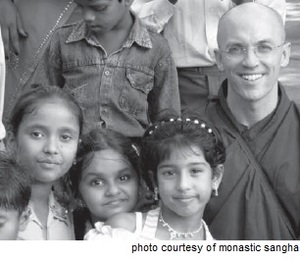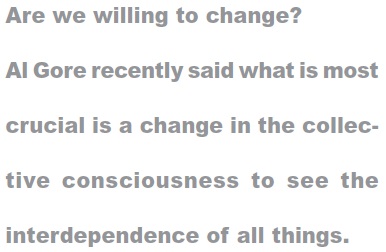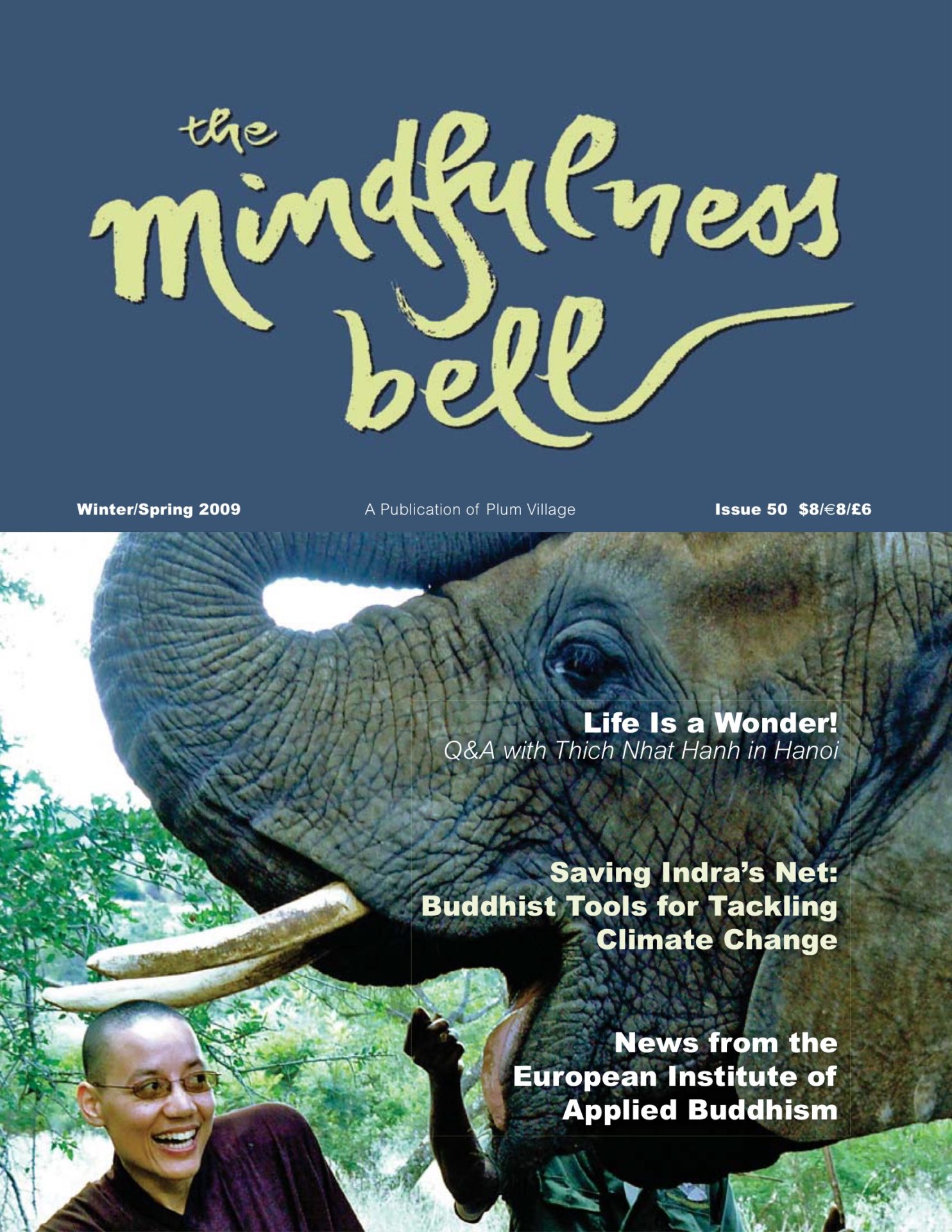
By Brother Phap Lai
Question to PV Listening Website — 15 December 2007
Teacher, One of the five precepts asks us not to kill. I am concerned about the effects of overpopulation and historical outcomes such as war. Global warming proponents indicate that the human population is to blame. Some suggest that to achieve a sustainable earth our population must be reduced by as much as four-fifths.

By Brother Phap Lai
Question to PV Listening Website — 15 December 2007
Teacher, One of the five precepts asks us not to kill. I am concerned about the effects of overpopulation and historical outcomes such as war. Global warming proponents indicate that the human population is to blame. Some suggest that to achieve a sustainable earth our population must be reduced by as much as four-fifths. The entire earth may be in the balance. If the scientific evidence is accurate what guidance can you give us in avoiding the unthinkable? — Steve

Dear Steve,
Thank you for your stimulating question and for having the courage to ask it. Many of us keep “unthinkable” thoughts hidden away, or we immediately believe in them without questioning their validity. History provides evidence that these thoughts — whether kept in a vault of shame or expressed philosophically to others — will one day be acted out at the collective level.
Overpopulation is indeed one factor that can build pressure for this to happen. The genocide in Rwanda was fueled by tensions that had built up due to pressure on common land and water resources caused by a combination of increasing population and environmental effects of global warming. The situation in Darfur is similar. Sadly there are people willing to exploit tensions to create division, hatred and fear in the desire for personal power and wealth or to impose an ideology. What can be done?
The environmental pressures our planet faces, of which overpopulation is an integral part, are tearing at the very fabric of the complex and diverse life that makes our experience so rich and beautiful today. Life on Earth is in trouble not in the future but now. It seems we are setting up conditions for a sixth mass extinction event on this planet. In Heat by environmentalist George Monbiot we read that foreseeable rises in temperature and carbon dioxide (CO2) levels are comparable with those that helped trigger the biggest-ever extinction event, at the end of the Permian period 251 million years ago — a period as ecologically diverse as today’s. Computer modeling tells us that with a ninety percent reduction of CO2 and other greenhouse gas emissions globally by 2030 we have a two-out-of-three chance to prevent runaway global warming and avert this destiny.
Monbiot then sets about demonstrating, by picking on some key areas such as transportation, household energy use, electricity supply, and some example industries that these cuts could realistically be made while maintaining a good standard of living. Of course the affluent minority would have to change their ways. For example we would need to severely restrain our long distance travel habits but this is surely more palatable than an eighty percent reduction in population. Are we willing to change?
Call for a Collective Awakening
Like you I am deeply concerned about the tendency of humankind to resort to war as a solution to our problems. War is the deepest expression of human suffering and represents a failure to face our difficulties and seek healing in us and between us. What is needed is compassion and brotherhood — a “war-like” effort in which we pull together as one people. Al Gore recently said what is most crucial is a change in the collective consciousness to see the interdependence of all things. Similarly Thay says: “We need a collective awakening; enlightenment can no longer be considered an individual matter.”

It seems clear that we are already suffering the unstoppable consequences of global warming and many of us will perish. Remaining in denial is not an option. Thay encourages us to accept our situation in such a way that we make peace with it in our hearts. Action taken from this place of peace will then be effective — right action — and is our best hope. But in taking on board the reality of what is happening we need to be careful. There is a tendency to fall into despair and become paralyzed. Unable to hold the situation mentally we try to forget what we know and take refuge in our own busy lives again. Once again we simply hand over responsibility to politicians and experts. However, without an informed and active public, politicians of selfish interest will take advantage. Eventually they will force upon us desperate schemes (backed up by “experts”) that will have more to do with seizing power and will undoubtedly make the situation far worse.

Dying a Spiritual Death
In your question you refer to a perceived need among some experts to reduce the world’s population by four-fifths in order for humanity to have a chance to survive. Your reference to the “unthinkable” suggests that war and genocide may actually form part of the solution. This thought if not unthinkable should be unconscionable.
At the intellectual level we can get lost in a maze of complex moral questions and believe we have to do the unthinkable for the greater good. More frequently I hear people, sometimes timidly, sometimes boldly, voice opinions that wars and pandemics such as HIV and TB are necessary because we need to reduce the population of people. If we are to think like this then we must be prepared to die and see our children die in the same manner. We all are brothers and sisters sharing this planet. Perhaps we see disease as mother Earth’s mechanism to balance things. It is true, we cannot predict or necessarily control the course of nature but how sad if we think letting or making it all happen over there will help our plight. Disease, famine, and war cause misery and chaos and that will affect us all. Their stability and happiness is our stability and happiness. We inter-are. As soon as there is an “us and them,” an “over there,” in our minds we have lost touch with this truth — the truth of interbeing.
No one would deny that overpopulation is a major issue we face as a global community. However, the idea that reducing the population by four-fifths will necessarily solve anything needs to be examined.
Suppose that we achieved that goal, either by actively killing people or passively turning a blind eye to genocides, the ravages of civil wars, or disease and famine in other countries. Thinking that this would favor the physical survival of the remaining one-fifth is to forget something of fundamental importance — namely that in the process we will all have died spiritually. In Buddhism it is clear that the means cannot be separated from the ends. The so-called ends are defined by the means. Thay makes this clear when he says, “There is no way to peace. Peace is the way.”
Staying Connected
The First Mindfulness Training, as well as asking us not to kill, also asks us to “cultivate compassion.” Compassion here is not simply an emotion but is rooted in the Sanskrit word karuna. Thay teaches us that karuna, to be translated properly, needs to convey the meaning of “the capacity to relieve suffering.” Compassion in this sense implies an understanding of the situation, knowing what to do and what not to do to help, along with the willingness and ability to act. Understanding is more than intellectual or practical knowledge.
Ravi Ravindra, Prof. Emeritus of Canada’s Dalhousie University warns us on this point:
The search for truth — when it becomes more and more mental and divorced from deeper and higher feelings such as compassion, a sense of the oneness and the like — leads to feelings of isolation and accompanying anxiety … Then one wants to control others and conquer nature. Much of our predicament arises from this very dedication to truth in an exclusively mental manner.
True insight is always in line with compassion and the truth of the interdependence of all things. This perspective can only be found when one is stable, peaceful, and connected with the heart.
When ideas to control population come up that at first seem abhorrent I suggest taking a long walk and sitting in nature. After calming the mind and enjoying the connection to life, then we are qualified to look into the situation. First we can see the real consequences of our idea if put into action. And in time insight into the situation will allow solutions not seen before to arise. There are always more creative less violent ways of helping.
Collapse of the American Dream
Looking more closely into the problem of overpopulation we might start by reminding ourselves that the U.S.A. population, although only four percent of the world’s, consumes twenty-five percent of the world’s oil supply. Its per-capita consumption of the rest of the Earth’s material resources similarly outstrips that of other countries. It is clear from this fact alone that how we consume is just as important as how many people there are. China’s and India’s consumption is growing fast, a growth that will soon require more than one planet Earth to sustain us. And yet in the vast majority of countries people are poor and not responsible for these phenomena. Ironically when we think of overpopulation we think of the poor in the so-called third world and yet these people’s ecological footprint is virtually zero. If one’s goal is to create a sustainable planet, then one must address consumption as well as population stabilization.
As a global society we need to turn in a different direction. We need to learn to live in a sustainable way, embracing simple living and focusing on community — sharing resources as opposed to the individual suburban utopia. In our small monastic community in New York, for instance, the cost of food per person is $2 a day. We eat vegan and try to eat local produce. Trips out to shop are also reduced because of communal living.
Collective awakening can gain momentum only with individual actions. To this end, Thay, in his public talks, often takes time to encourage us to reduce our consumption of meat. Thay quotes figures that point out the environmental cost of meat consumption. (See Thich Nhat Hanh, Mindfulness in the Marketplace, page 72, and the Mindfulness Bell, Winter/Spring 2008). If everyone in the U.S. were to reduce their meat consumption by half that would reduce greenhouse gas emissions more than if everyone were to drive hybrid cars. Seeing vegetarianism as a way out is not new. Albert Einstein said: “Nothing will benefit human health and increase chances for survival of life on Earth as much as the evolution to a vegetarian diet.”
Collectively of course we can do a lot more — for instance, by morally supporting, inspiring and educating each other; making collective commitments (see the environmental initiative sign-up sheet on the Deer Park website), pooling ideas and resources; and speaking as one voice to industry, the media, and politicians. Ultimately we need the political will to implement national and international legislation that will meaningfully reduce our impact and move us into sustainable living. This requires the people’s deep understanding of the situation; politicians of integrity must have a support base.
Sustainable Compassion
Stabilizing human population is one aspect, albeit an important aspect, of the challenge to restore our ecosystem’s stability. In his book Plan B 2.0, Lester Brown presents a comprehensive and budgeted plan to literally “rescue the planet” under five main categories: (1) eradicating poverty and stabilizing population, (2) restoring the Earth, (3) feeding seven billion people well, (4) stabilizing climate, and (5) designing sustainable cities. He argues that to achieve a stabilized population of a well-fed seven billion is possible; his overall budget for Plan B implementation is $161 billion. Compare this to the money spent on the Iraq war, estimated to surpass $2 trillion (Harvard Magazine).
Linking the stabilization of population to the eradication of poverty as Lester Brown does is important. Adequate nutrition, good health care, and parental support especially for women, access to family planning services, readily available contraception along with education, these are all affordable and essential to creating the necessary conditions to empower people to make choices about the size of their family. Interestingly much research (e.g., UNICEF) shows that the most effective way to reduce the number of children born is to educate girls and keep them in school. This is a goal we can all help to achieve.
Draconian methods may achieve short-term results but also have unforeseen adverse consequences. For instance, I do not advocate enforcing fertility control measures as in China. It has caused a huge suffering which will be passed on for generations and has arguably not achieved a reduced impact on the Earth (see Collapse by Jared Diamond).
Lasting solutions respond compassionately to the real needs of the people. They come from those who are involved in the actual situation and grounded in love, which cannot be said of either Communist party policy implemented by a police state or IMF capitalist ideology enforced by economic leverage. Lasting solutions usually come from grassroots organizations — from the people themselves. They often require modest funding and only need to be supported by understanding authorities and not be obstructed by them.
Offering Our Gifts
Getting involved in our local community is therefore key. In this way we do not fall once again into forgetfulness or despair but can help inspire hope, especially in the younger generation who inherit our legacy. Finding and building a community of likeminded individuals to work towards this can alleviate our feelings of isolation and fear. In community we find a way to contribute our own special gifts to this cause.
Some reading is helpful. I can recommend the work of environmentalists and social activists Lester Brown, George Monbiot, and Jared Diamond (books cited above), Joanna Macy (World as Lover, World as Self), John Seed, and Paul Hawkens (Blessed Unrest). They help us understand the situation in all its complexity and offer us practical and humane ways to respond to the crisis. Thich Nhat Hanh himself has a wonderful new book on the subject, The World We Have.
Ultimately, the crisis we face is a spiritual one. Developing our own practice of meditation and mindfulness, finding and building Sangha — a community practicing the path of understanding and love. These are the important things to do. Personal practice gives us an inner refuge, a place of stability to go back to. The Sangha becomes a boat on which we can navigate the storm together. Practicing together we cultivate the much-needed insight, inner strength, and spirit of non-fear that we need to respond compassionately to our situation.
Thank you again for bringing up this topic for all of us to reflect on and please know that your practice and deepening insight is important to us all.
Brother Phap Lai currently resides in Blue Cliff Monastery, New York.

